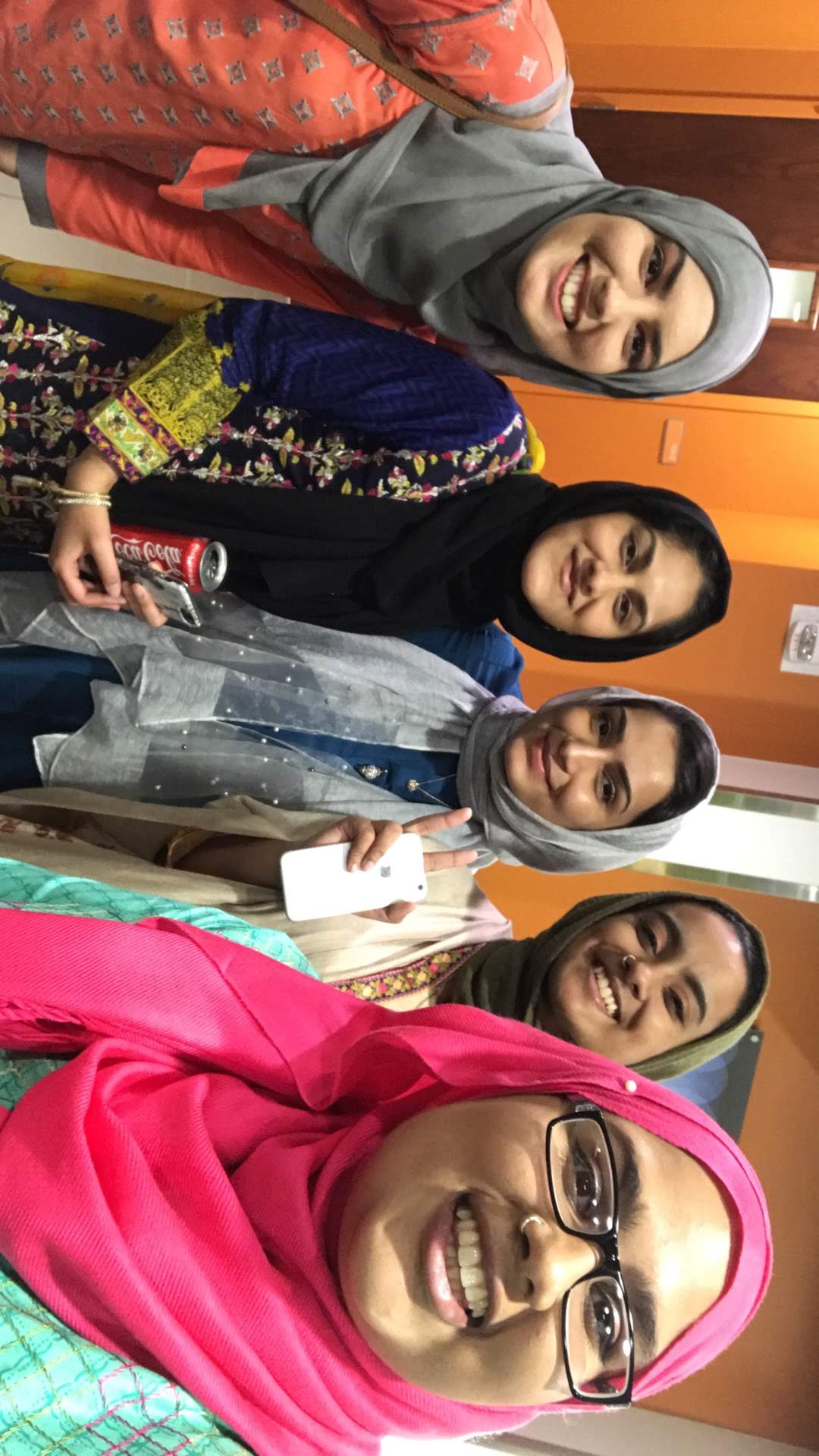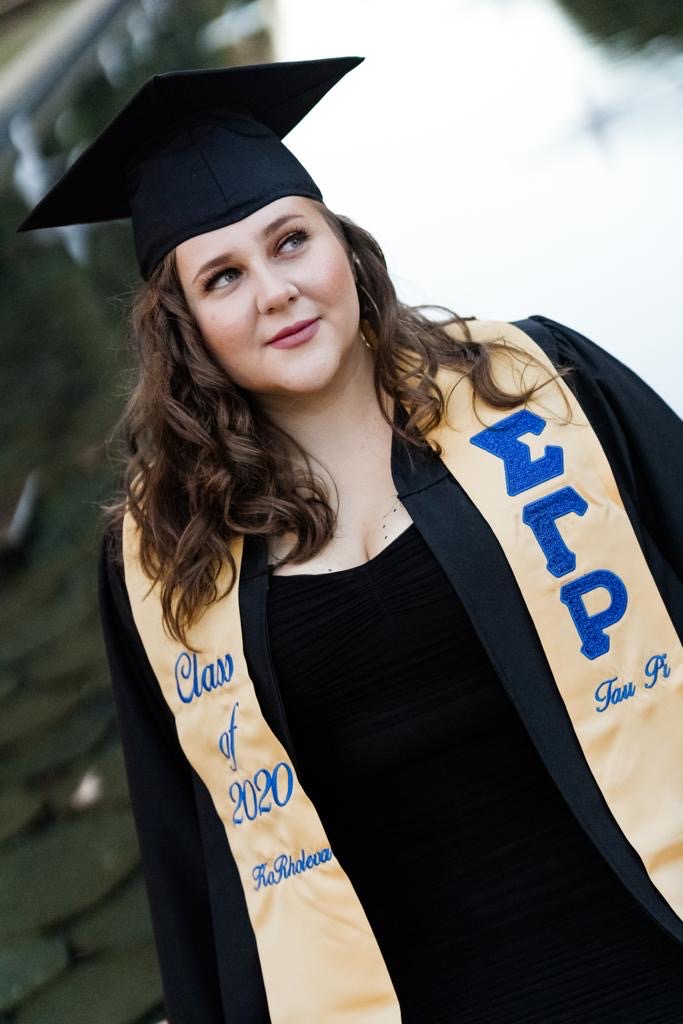Comet Conversations: Alumnae Share What Ramadan Means to Them
In honor of Ramadan, the holy month observed by Muslims around the world, we talked to a couple UTD graduates who observe the holiday. Below, Safa Tariq BS’18 and Aiya Almzayen BS’20 share their early memories of Ramadan, what it means to them and how friends, family members and coworkers can show respect to the Muslim community throughout those 30 days.
First, thanks for sharing your perspective on Ramadan with our alumni community. What are some of your early memories of Ramadan?
Safa Tariq: You’re not required to fast until after you hit puberty, because that’s when you’re considered an adult in Islam. But when I was about 5 or 6 years old, I heard my parents were participating in fasting, and it sounded so cool. I remember I asked my mom if I could do it with them. The next morning, we woke up, we ate good food, and I remember as soon as the sun came up, I went back in the kitchen with a glass for water and my mom was like, “What are you doing?” I didn’t get it. That’s my most fond memory. I just wanted one little sip of water. I was just so curious and fascinated by the idea of fasting.
Aiya Almzayen: Growing up in Syria, we always would have this person that would walk around outside our neighborhood in the morning and hit a drum. He would say the English equivalent of, “Those who are asleep go ahead and wake up and fill up your tummies.” And he would say it in a sing-song way. Another big thing is we would always hear the Friday prayer, and on Sundays we would hear the church bells. We had a mosque across the street, so you’d hear the call to prayer because it was so loud. It gave us a lot more of a sense of community.
Do you remember your first time participating in Ramadan?
ST: I was in middle school at the time. I explained to my friends that they may not see me at the lunch table. I had to explain that it was part of our religious beliefs. To avoid being tempted by food, I decided to stay in the library during lunchtime instead. I remember thinking, “This is going to be so lame; I’m going to be the only one.” But to my surprise, I saw some other Muslim kids there. The days got easier. After two weeks, I was like, “I think I can go back to the cafeteria and the lunch table.” It was definitely weird, but it did turn out to be just fine.
AA: It was really nice. It wasn’t as bad as I thought it was going to be. I was surprised at how full I would get so fast when it was time to finally eat. After a long day of not consuming anything, you can be hungry in your brain, but your stomach won’t accept that much. I would eat literally the smallest portion. I would drink water, then have soup. After that, I’d eat maybe a spoonful of rice because nothing else will fit in my stomach.
How do you cope with the inability to eat or drink during the day?
ST: It’s definitely mind over matter. The point in Ramadan, besides fasting, is to increase your charity, get in a better relationship with God and empathize with people who don’t have what you have. When you have that mindset, you keep yourself busy with other things. For me and many others, they’ll read the Quran, they’ll pray a little extra. It’s a natural, habitual thing.
AA: Fasting wise, the only thing you lack is water. With food, it’s not that bad. Especially here in Texas, thirst is what gets you. Usually you can just put some water in your mouth as if you’re using mouthwash, as long as you don’t swallow it, it’s OK. It just kind of rejuvenates you.

Safa Tariq BS’18 (far right) celebrated Ramadan with her sister and a group of friends in UT Dallas’ Galaxy Rooms in 2018.
What does the holy month mean to you?
ST: For me, it’s a physical, mental and spiritual discipline. There have been so many studies that show how fasting is beneficial to your health. You’re clearing your thoughts out. It’s almost like a type of self-love or self-care. What am I putting into my body? What am I thinking about? This is the month that the holy book, the Quran, was revealed to the Prophet Muhammad. It has a lot of value and teaches us who we are and what we came here to do. It’s also about practicing patience and kindness and charity as well.
AA: For me, the first thing is a closer connection to God and the willingness to sacrifice our basic human needs. The whole purpose of Ramadan is to feel for the poor and for us to give that food to people who need it. It’s our way to recognize what others who are less fortunate may be going through. Back home, we used to cook and share our food with our neighbors and the less fortunate, so that’s a big portion of it. It’s also about sharing the love and care within the community. Just strengthening your bond with God, because you’re deprived of things and you have that time to communicate with God.
What does a typical day during Ramadan look like?
ST: In the U.S., we observe about 16 hours of fasting. We wake up close to 4:30 a.m. and eat whatever you want, and around 6 a.m. you start your fast. We pray every day, five times a day. Those prayers are mandatory for Muslims regardless of Ramadan. First prayer is around 5:30 or 6 a.m. The next one is in the early afternoon, around 1 or 2 p.m. The third prayer follows closer to the evening, around 5 p.m. The fourth prayer is 8 or 8:30 p.m. and the last prayer is around 9:30 or 10 p.m. The fourth prayer time is when we open/break our fast. No one knows if you’re going to live the next day, so you’re definitely trying to put more into each prayer like it’s your last. It sets a tone.
AA: I usually wake up before sunrise and eat, usually dates because that’s one of the things that Muhammad ate. I drink water and eat whatever other food, usually something that’s not too heavy. When the sun rises and our prayer time comes, I pray, and then go back to sleep. I try to sleep as much as I can to shorten the amount of time I need to be fasting. I wake up around noon and have the second prayer, and then I have work at 3 p.m. Once I start work, I work up until I have to break for fast. The whole day I fantasize about different kinds of food. I have these cravings for things I don’t normally eat, and then it’s just a thought I carry throughout the day. Then there’s the last prayer around 9, 10 p.m.
For people who don’t observe the holiday, what would you want them to know about it?
ST: That it’s a month-long period in which Muslims around the world have a physical, spiritual and mental discipline to get closer to God and fast from sunrise to sunset. It’s to cleanse themselves and lead another year of being a better person than what they came in.
AA: I would want them to know the intention behind it. Just so it’s not like, “Oh people do this just because they’re told to by their religion.” There is a true meaning and a good cause behind it. In the eyes of anybody, whether you’re Muslim or not, if you understand the reason for it, you’ll see its good reasoning. I would also like people to be a little more conscious of it, especially in America.
What misconceptions do you think people have about Ramadan?
ST: One misconception is people think we’re able to have water. We’re not, not at all. The semester I graduated from UTD, I was giving a presentation with my group, some of whom were also fasting. My throat was getting really dry. At the end of class our teacher was giving us a critique, and our teacher was like, “You guys sounded like you were struggling.” And we told her we couldn’t have water. People will ask, “Can you brush your teeth? Can you take medicine?” Yes, you can.
AA: I would say lack of education and understanding is a problem. For example, I usually work until 10 p.m., so I needed to get an accommodation with work to break my fast. I called our human resources department, and I was telling the representative that Ramadan is coming up and I needed to break my fast. She mentioned a celebration day reserved for Ramadan, but I had to tell her that it was a month-long thing. I assumed that a lot of people know about it, but not a lot of people in the U.S. really do.
What can friends, coworkers and family members do to help or respect those who are observing Ramadan?
ST: I know for me, when I sit with people who aren’t observing this month, if they’re eating or drinking water, I don’t mind being around them, but other people may. I think they should just be respectful of just not exaggerating their eating habits. Kindness goes a long way, too. For people to just say, “Happy Ramadan!” that means so much to us. Our sleeping habits and caffeine intake also change, so to just be mindful of what we’re going through. I would also love for people to ask us about Ramadan. It really diminishes the ignorance in our society. I would love to tell people about Ramadan, so maybe they can learn something and relate.
AA: I think people can definitely be more conscious about what they’re doing around people who are fasting. If somebody is eating next to them, just ask if it’s OK to eat. Don’t do too much. I know my friends or people that I know would be like, “OK, let me fast with you for a week or a couple of days,” and they would fast with me to see what it’s like. That’s education in a different, more practical way, seeing what a person goes through. That was pretty cool. If you’re down for it, go ahead and try it and see what it feels like.
What does it feel like when those 30 days are up and you can resume your normal eating and drinking habits?
ST: The last day of Ramadan is so heartbreaking. That month brings such a closeness with God and a binding with your own self. It’s like, “Whoa, I just changed in a whole month and it feels so good.” You almost don’t want it to end. That’s the beauty of Ramadan; that it’s only one month of the entire year, but it’s a month that really changes you for the rest of your life.
AA: At the end, it definitely feels like the ending of a spiritual journey. You feel relieved, but it’s also weird because you’ve gotten into a routine of doing something and now you’re able to wake up and drink water.
